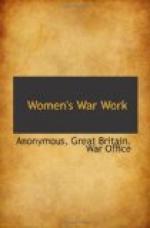The financial advantage to the members of forming an Association is quite easy to understand. Every week the takings are invested by the Secretary (using a special slip given by the National Committee) in War Savings Certificates, so that when members finish subscribing for a certificate, instead of getting one dated the day they finished paying for it, as it would be if they saved by themselves, the Secretary has a store of earlier dated certificates on hand, and the member receives one of these.
This works out quite fairly if one rule is observed—never give any one a Certificate dated earlier than the first week they started paying for it.
The people of England needed a great deal of education in war saving. We had to fight the strongly held conviction that of all sins the most despicable is “meanness,” and that too much saving may seem mean.
No Englishman will ever really admit he has any money, and he was inclined to question your right to talk about the possibility of his having some—and your right to tell him what to do with it, supposing he had any. Some of them were a little suspicious that it was the workers we were talking to most—it was not—and some of them were not quite sure they wanted their employers to know how much they saved. That is entirely obviated by the men running their own associations. Other people told you the people in their District never did, could, or would save and were spending their big wages in the most extravagant way—that pianos and fur coats appealed far more than war savings certificates. The official people in the towns when we approached them about conferences said much the same in some cases, but, yes, of course, you could come and have a conference and the Mayor would preside and you could try. And you did, and in six months they had dozens of associations and thousands of members and had sold some thousands of certificates. We sell about one and a half million certificates a week and have sold about 140 millions since March, 1916. The appeal that won them was not only the practical appeal of the value of the money after the war for themselves, to buy a house, to provide for old age, to educate the children. The strongest appeal was the patriotic one. Save your money to save your country. Throw your silver bullets at the enemy. We have not been content to say only “save,” we have tried to educate our people on finance and economics. We have tried to show them that no country can go on in a struggle like this unless it conserves its resources—not even the richest countries. We have tried to appeal to the spirit behind all these things and our Chairman in one of his admirable speeches said:
“It is upon these simple human feelings of loyalty, comradeship and patriotism that the great War Savings Movement is founded. Because of the strength of this foundation I feel convinced that we shall succeed in the great national work we are setting out to perform. However difficult our task may prove, however serious the times ahead, this spirit will carry us safely and triumphantly through everything, and in the end we shall find ourselves not weakened but strengthened on account of these same difficulties which we shall most surely overcome.”




